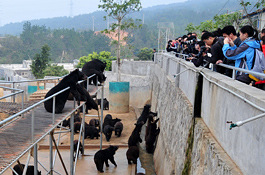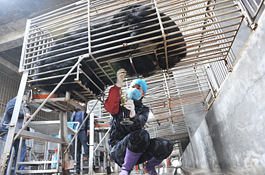|
 |
 |
|
BEAR CAPTIVES: Journalists visit the Guizhentang Pharmaceuticals Co. Ltd. bear farm on February 22 (WEI PEIQUAN) |
DAILY ROUTINE: A staff member extracts bile from a live bear at a bear farm of Guizhentang Pharmaceuticals Co. Ltd. in Hui'an, Fujian Province, on February 22 (CFP) |
Guizhentang Pharmaceuticals Co. Ltd., a company based in southeast China's Fujian Province that produces traditional Chinese medicine (TCM) from bear bile, opened one of its bear bile-extracting farms to the media on February 22 and 24, in an attempt to quell criticism over the practice of draining bile from live captive bears.
In the two days, more than 200 journalists from various media outlets visited the farm in Huian County in Fujian. As one of the largest bear farms in China, it is home to more than 600 bears, of which more than 400 are above 3 years old and have their bile extracted daily.
Bear bile is used in traditional medicine in China and several other Asian countries because it is thought to have health benefits such as detoxification, cleansing the liver and improving vision.
The extraction of bear bile for medicinal purposes has met with opposition from animal rights activists in recent years. They claim the bears are subjected to crude surgery that leaves permanent wounds in their abdominal walls and gall bladders, causing serious diseases and even death.
The protests have been particularly intense since early February following Guizhentang Pharmaceuticals' public listing bid was made public.
The funds raised through the planned initial public offering (IPO) would help increase Guizhentang Pharmaceuticals' breeding capacity to 1,200 bears, producing 4,000 kg of bear bile annually, according to a statement on the company's website.
"If the IPO is successful, it would be a huge blow to the animal protection campaign, and it would be irresponsible for future shareholders of the company, because the industry has no future," said Zhang Xiaohai, Director of External Affairs at the Animals Asia Foundation (AAF), an animal protection organization headquartered in Hong Kong.
For more than 3,000 years, bears have been hunted in Asian countries for their gallbladders and the valuable bile within. Only in the 1980s, after rampant hunting greatly reduced their numbers, did countries like China and the Republic of Korea ban bear hunting.
But wild bears were then caught and farmed for their bile.
Bear farming is still legal in 11 of the Chinese mainland's 31 provinces, municipalities and autonomous regions.
In 2006, the country had 68 registered bear farms where about 7,000 black bears were kept for bile extraction, statistics from the State Forestry Administration showed.
However, according to the AAF's statistics, the number of bear farms had increased to 98 by 2011, and it is estimated that about 20,000 black bears are being kept for bile extraction.
On February 1, a full list of applicants for IPOs was released by the China Securities Regulatory Commission as part of regulatory moves to ensure more transparency in the securities market. The inclusion of Guizhentang Pharmaceuticals, which boasts the largest bear breeding base in south China, on the list sparked an outcry from those who believe that much of the company's profits are driven by selling bear bile.
This is the company's second bid to go public in a year, following a failed attempt in February last year amid a fierce public outcry.
With the case drawing wide public attention, more than 70 animal welfare NGOs and celebrities signed a petition on February 14 addressed to the China Securities Regulatory Commission, calling for denial of Guizhentang Pharmaceuticals' bid. They accused the firm of animal cruelty because of the invasive bile extraction process.
While members of the public and animal welfare advocates have called for eliminating bear bile extraction, some TCM experts defended the industry, citing the "irreplaceable" medical value of bear bile.
Fang Shuting, head of the China Association of TCM, said that there are many misunderstandings among the media and the public about the process of extracting bear bile.
He admitted when bile-extraction techniques were first introduced to China more than 20 years ago, some farms used surgically implanted metal tubes, causing tremendous pain to bears. "At the end of the 1980s, Chinese farms developed a painless technique, free drip, to extract the bile that does not involve a duct," Fang said at a news conference on February 16.
| 